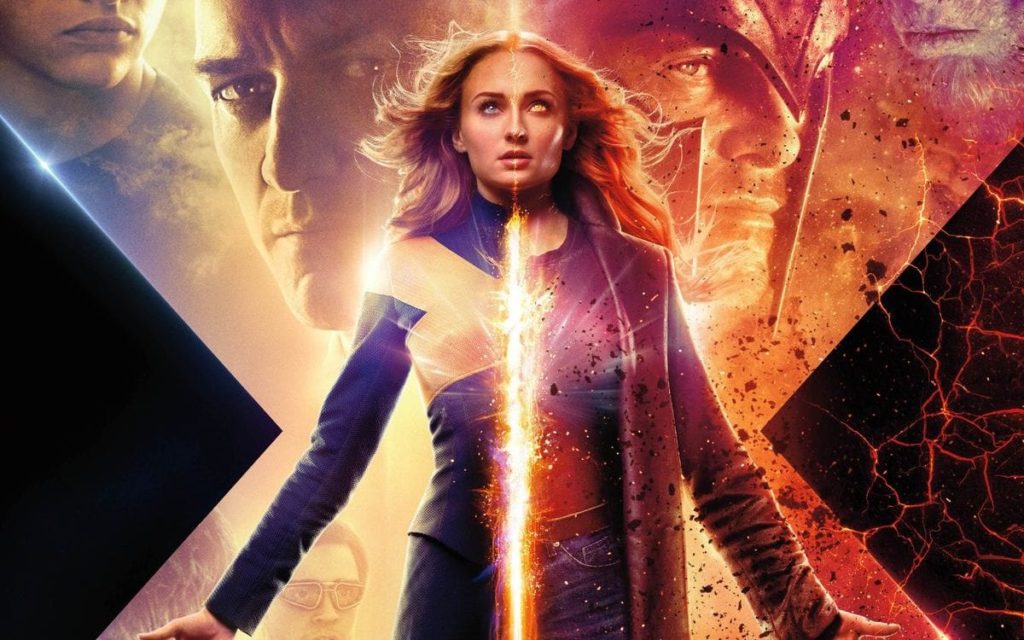Dark Phoenix Is an Enjoyable, Flawed Sendoff for the X-Men
Written by Ian Thomas Malone, Posted in Blog, Movie Reviews, Pop Culture
For all the ways that 2011’s X-Men: First Class represented a fresh start for the superhero franchise that helped establish the genre as a cinematic powerhouse, the series never really let go of its roots. The majority of the principal cast of the original trilogy returned for 2014’s Days of Future Past, which also served as their do-over sendoff following the lackluster reception to 2006’s The Last Stand. Hugh Jackman’s Wolverine remained a major part of the franchise, starring in his own trilogy in addition to cameo appearances in both First Class and 2016’s Apocalypse. Deadpool, a character first played by Ryan Reynolds in 2009’s poorly received X-Men Origins: Wolverine, existed ostensibly in both worlds, while shattering the fourth wall in just about every way imaginable.
The X-Men franchise’s timeline is such a splintered mess that it’s hard to call the James McAvoy/Jennifer Lawrence/Michael Fassbender-lead team a reboot, a prequel, or even a second generation. Like Days of Future Past, Dark Phoenix set out to clean up the mess that was The Last Stand, while serving as a farewell to Fox era before Disney takes over the reins. Deadpool is likely going to be only remaining tie to the franchise that first began in 2000, assuming his R-rated humor has a place in Disney’s family-friendly world.
Dark Phoenix is not a film particularly concerned with serving as the finale for nearly twenty years of history. The film is the first with the name X-Men in the title not to feature an appearance from Wolverine. Only four actors from First Class remain, McAvoy, Lawrence, Fassbender, and Nicholas Hoult. Many of the X-Men in Dark Phoenix, including Sophie Turner’s Jean Grey, only made their debut in the previous film. The lackluster reception to Apocalypse further complicates the idea that this current iteration of the team is capable of meeting the broader expectations that the franchise’s extensive history has created.
The best it could hope to achieve is a satisfying send off to the four characters who have carried this chapter of the franchise. McAvoy, Lawrence, Fassbender, and Hoult all get their moments to reflect on their journey, even if Dark Phoenix’s broader narrative isn’t really about wrapping up the X-Men. It’s a film about Jean Grey that’s only sort of about Jean Grey. Part of this reflects the reality of Turner’s late entrance into the series, as The Last Stand’s attempt at the storyline featured Famke Janssen, whose earlier take on the character had played a pivotal role on the team up to that point.
The audience simply hasn’t had enough time with Turner’s Grey for the character to feel all that compelling. At times the film feels like it’s relying too hard on the audience’s familiarity with either the character or Turner as an actress, spending little time presenting a case for why we should care about this iteration of the powerful mutant. With obligations to wrap up the franchise, this approach is hardly a bad idea, but the film’s emotional core at times feels completely all over the place.
The narrative ends up working pretty well as a film. The action scenes are quite enjoyable, giving each mutant a chance to work their magic one last time. Jessica Chastain gives a compelling performance as Vuk, the leader of the alien race the D’Bari, who seek to harness the power of the Phoenix after the force destroyed their homeworld. At times, Vuk feels a bit too obligatory as an antagonist, but the film’s preoccupation with X-Men’s own sense of morality is a better use of its time.
At times, the film frames Charles Xavier as its true villain for using his school as a farm system for broader political motivations, a mildly awkward heel turn for McAvoy that doesn’t feel entirely earned given the arc of the character for the past few films. The humans vs. mutants dynamic remains present, but isn’t the true focus of the narrative. Casting Xavier as a manipulator is a means to an end, which is certainly fitting given that this is in fact, the end.
With a runtime of just under two hours, Dark Phoenix moves at a brisk pace considering all it needed to accomplish. The film presents a self-contained narrative while simultaneously wrapping up the franchise’s extensive history. It juggles all of that surprisingly well, with an excellent final act that brings everything all together.
The biggest letdown of the recent X-Men era has been the poor handling of Evan Peter’s Quicksilver, who looked poised to be the breakout star of the franchise after his excellent debut in Days of Future Past. Quicksilver never reached the high of that beautifully shot kitchen sequence set to the music of Jim Croce’s “Time in a Bottle,” and only plays a minimal role in Dark Phoenix. Under different circumstances, Peters might have had a solo outing in the role plus another installment in the main franchise, but Disney’s acquisition of Fox called for this to be the end of the line.
Dark Phoenix was not particularly well-equipped to be the finale for close to two decades of franchise lore, but it makes the most of its truncated circumstances. We barely know these iterations of Jean, Cyclops, Nightcrawler, and Storm. It’s hardly this film’s fault that the franchise is headed into hibernation before an eventual reboot into the MCU. It’s an awkward goodbye, but an enjoyable movie. McAvoy, Lawrence, Fassbender, and Hoult all deserve better, but they made the most of an imperfect situation.











